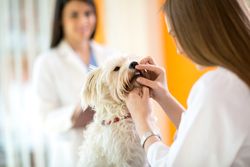
The canine member of your family can experience oral health issues just like humans. Here, learn about common dental problems affecting dogs to help your four-legged friend enjoy healthier teeth and gums. The right home practices combined with veterinary care preserve the dog’s “smile.”
What Are the Common Dental Health Issues in Dogs?
1. Plaque & Tartar Buildup
Dogs require routine teeth cleaning to remove plaque, a bacterial film that coats teeth and promotes gingivitis symptoms such as bleeding, red, and inflamed gums. Minerals in canine saliva turn the sticky film into tartar, a hard substance that forms under the gumline to further irritate the gums and cause them to recede. Use toothpaste and a rubber brush you place over your finger to remove daily plaque accumulations.
2. Bad Breath
Without routine brushing, decaying food particles combined with mouth bacteria and acids make your dog’s breath smell foul. Avoid “dog breath” issues by brushing the canine’s teeth every day, and provide dental chews that scrape off food particles and plaque as treats. Offer the treats after each brushing session so your canine associates dental care with rewards.
3. Gingivitis & Gum Disease
 As plaque and tartar increase in your dog’s mouth, so does the risk of gingivitis and gum disease. If your dog has gingivitis, think of the gum inflammation and irritation as warning signs. Gingivitis is much easier to reverse with home teeth cleanings and veterinary care than gum, or periodontal, disease. The disease causes severe gum recession that makes teeth loosen and fall out without treatment.
As plaque and tartar increase in your dog’s mouth, so does the risk of gingivitis and gum disease. If your dog has gingivitis, think of the gum inflammation and irritation as warning signs. Gingivitis is much easier to reverse with home teeth cleanings and veterinary care than gum, or periodontal, disease. The disease causes severe gum recession that makes teeth loosen and fall out without treatment.
4. Infections
The severe periodontal disease leaves your dog’s mouth vulnerable to tooth infections. As gums recede, they create gaps between the tissue and tooth roots that allow bacteria to build up. Abscesses, or pockets of pus, form at the root of affected teeth to contain the bacteria and combat the infection. The pus pockets can cause facial swelling if they get large enough, indicating serious bacteria accumulations.
Dogs can also sustain oral infections from injuring mouth tissue on sharp objects. Veterinary care determines the cause of the infection, with veterinarians often providing antibiotic medication. If the infection is due to gum disease, the vet will recommend deep teeth cleaning and guided tissue regeneration among other treatments depending on the disease’s stage.
Maintain your dog’s teeth and gums with veterinary care services from Elyria Animal Hospital. Known for a caring staff that provides a full range of vet services to cats and dogs throughout Elyria, OH, and the surrounding areas, this animal hospital also has an in-house laboratory that provides heartworm tests, chemistry panels, and urinalysis among other things. Call (440) 365-3818 today to schedule an appointment or learn more about veterinary care services online. Visit Yelp for recent reviews.
About the Business
Have a question? Ask the experts!
Send your question

